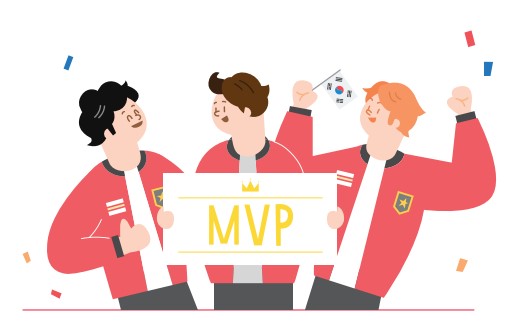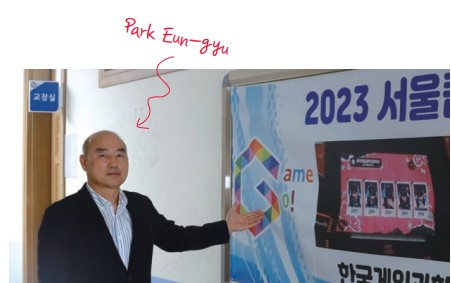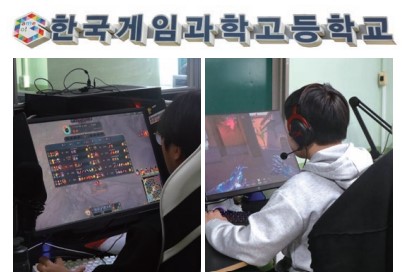In September 2023, Korean esports athletes achieved a remarkable feat at the 2022 Hangzhou Asian Games by earning four medals. Additionally, Korean teams continued their dominance in the “LOL (League of Legends) World Championship,” the largest tournament of its kind, by winning in both 2022 and 2023. This consecutive success has contributed to the growing popularity of esports in Korea.
Glimpse into Students' Esports Passion
Yun Jun-young from the Department of IT Convergence Mechatronics Engineering at JBNU and Lee Chan-woo from the School of Electrical and Computer Engineering at the University of Seoul shared diverse perspectives on the esports culture in Korea.
Q. What is unique about the Korean esports culture that can’t be seen in other countries?
A. Yun: Korean gamers tend to have a more competitive spirit compared to gamers from other countries. I think that Koreans are placed in a competitive environment from a young age because of their education, and this ultra competitive educational background influences their behavior in games. I have also observed the enthusiastic culture of support, particularly in the LCK (LOL Champions Korea) community, where spectators collectively shout, before the start of a game, ‘One, two, three, (team name), fighting!’. I think this culture, where everyone unites to support a team, has developed well in Korea.
Lee: I think that there is a culture in which Korean gamers emphasize the importance of ‘victory’ compared to gamers in other countries. For example, in games like Teamfight Tactics*, when strategies that can increase the chances of winning spread on the internet, they quickly become widespread in Korea and become the mainstream meta**. However, on the game servers based on the North American schedule, these trends spread more slowly, sometimes leading to imbalances in the game on the Korean servers. I also think that Korean gamers complain more often when software patches are not applied in a timely manner. Additionally, similar to Korean fandoms in other fields, fans of Korean teams have a positive culture of passionately cheering for their team's victory, expressing these desires through sincere support and well-wishing.
Q. Do you feel that the global popularity of esports has increased in the past several years?
A. Yun: Yes, I have. Over the past few years, major media companies and sports organizations have consistently invested in esports. For example, the prominent German automotive company Mercedes-Benz sponsors esports tournaments, and parent companies operating esports teams run esports academies to discover talent.
Lee: Of course. When I was younger, I felt that interest in esports was limited to males in their early teens and twenties. However, nowadays, I feel that people of various age groups enjoy esports. I've been to a League of Legends match, and there were diverse individuals of all ages attending. I believe that the perception of esports is gradually changing in a positive direction, appealing to a more diverse audience across various age groups.
Q. Is there a cultural experience in Korean esports that you would recommend to someone who has never experienced it?
A. Yun: I would recommend trying out a PC bang and watching an esports tournament. Korea is a powerhouse in the IT field and is recognized as the mecca of esports. Because of this, the PC bang culture has evolved significantly. Additionally, watching an LCK match in person is a great way to experience Korean esports culture.
Lee: I would recommend experiencing a PC bang***. Many Korean students frequently visit PC bangs as part of their entertainment culture. In addition, in PC bangs you can enjoy a variety of snack food and the latest gaming equipment.
* A strategic, turn-based game where players assemble and deploy an army of chess-like units using LOL Champions (Characters) that autonomously battle opponents in each round.
** The flow and trends of strategies, tactics, and other elements aimed at winning a game.
*** It is a Korean term for internet gaming centers where people can rent computer stations to play video games and access the internet.

It Was Just Game, But Not Anymore
Park Eun-gyu, an instructor who trains esports athletes at Korea Game Science High School, talked about the history of esports and of esports athletes. Park explained that Korea’s video game industry developed under negative circumstances. In the 1980s, arcade games were first introduced in Korea. At that time, many people thought it was usually played by students who did not study hard. Later, in the 1990s, PC bangs were established. During that time, PC bangs became a place of refuge for businessmen who were laid off during the 1997 Korea Currency Crisis (IMF). Afterward, with the widespread adoption of personal computers in households, there had been a surge in individuals playing games obsessively, leading to negative perceptions about gaming. Park also talked about how the popularization and dissemination of games naturally led to the birth of the esports business. In the 2000s, Starcraft, being the most popular game at the time, began a league and gained immense popularity. Nevertheless, its popularity went down due to allegations of match-fixing* and the collapse of the broadcasting industry in the mid-2000s. In the 2010s, with the launch of LOL in 2011, a game league was created and gaming was revitalized to form the current large esports market. According to a survey conducted by the Korea Creative Content Agency, the scale of the esports industry in Korea has not only more than doubled, increasing from 603 billion won in 2014 to 1,398 billion won in 2019, but has also demonstrated steady growth at an annual average rate of 18.3% since 2014.
* It refers to the act of manipulating wins and losses and scores by intentionally inducing the desired result of the game by players and coaching staff in a game. In other words, “win trading”

Breaking Barriers: Shifting Perceptions in Korea’s Esports Realm
Park highlighted the challenge of altering public perception toward games and esports in Korea due to its lack of recognition as a legitimate sports event. He said, “In foreign countries, unlike in Korea, esports athletes are treated similarly to other sports athletes. Korea also needs to improve its treatment of esports athletes.” Park talked about the important skills needed to become an esports athlete. Since current esports are played in teams, unlike Starcraft in the past, esports athletes are required to have a sense of cooperation. Sophisticated hand movements, quick muscle response abilities, and self-control to maintain composure are also required. Based on the above, he also detailed what education the Korea Game Science school provides to students training to become esports athletes. Game practice and training take place for four to ten hours a day. The curriculum includes not only game practice, but also static exercises to develop physical strength as well as providing future planning on the career span of esports athletes. In conclusion, Park emphasized, “Esports athletes don’t merely play games; they undergo systematic and rigorous training. I hope that the perception of esports and esports athletes will change and that we will help develop a sound game culture and industry in Korea.”

Video games have now become sports. The esports scene in Korea is vibrant and passionate. You might discover more than just fun and excitement; genuine teamwork and unity may be waiting for you. Why not experience the fervor of Korean esports today?
| Kim Doe-hye, Shin Mu-hyun Reporters

